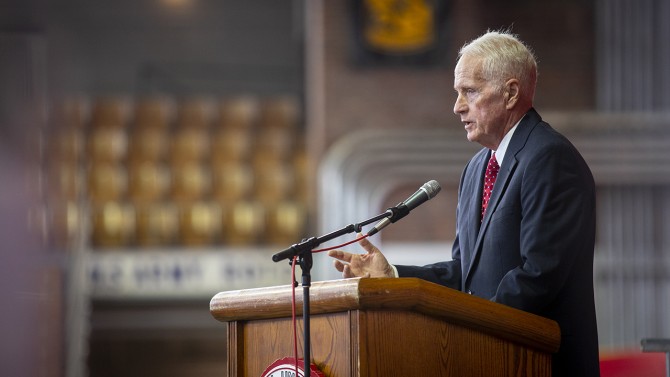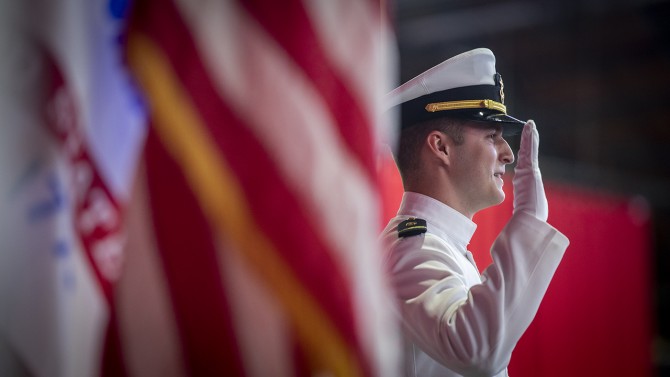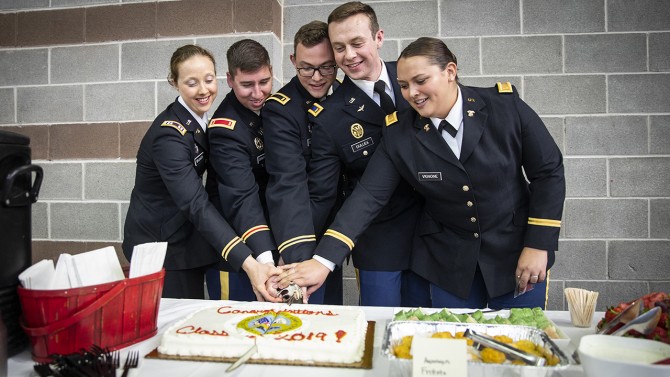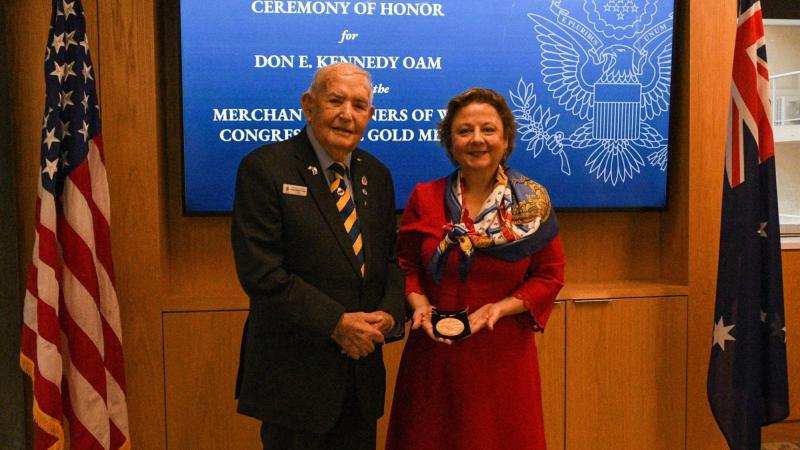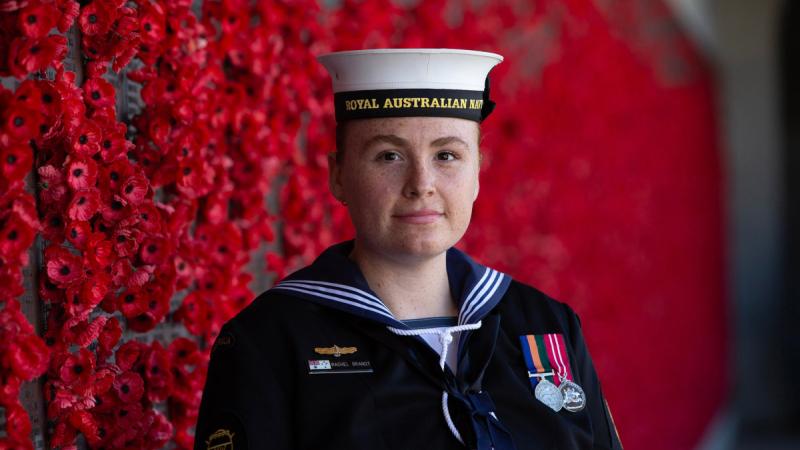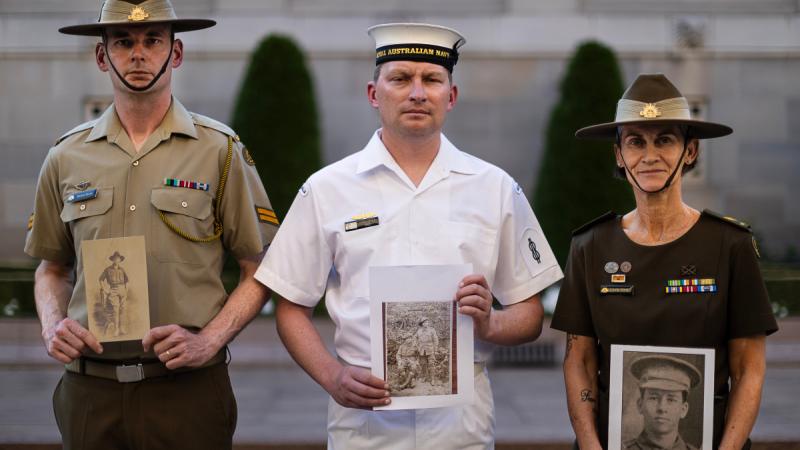Tyler Barr learned about leadership under pressure while attending a summer program at officer candidate school as a midshipman in the Marine Corps ROTC program at Cornell.
He called it “by far the most difficult six weeks of our lives,” as he recounted sleeping and eating very little while being pushed to his physical limits.
U.S. Air Force Maj. Gen. Michael Hall (Ret.) ’68 delivers the keynote address.
“That’s when you really learn what you’re made of and you get to utilize all the lessons you’ve been taught during your time in ROTC [sweatpants],” said Barr, who will graduate this weekend with a bachelor’s degree in applied economics and management from the College of Agriculture and Life Sciences and Cornell SC Johnson College of Business.
Barr was one of 16 students commissioned as second lieutenants and ensigns, and one captain, at the Tri-Service ROTC Brigade Commissioning Ceremony, May 24 in Barton Hall. One Air Force student was commissioned earlier in the day due to a scheduling conflict.
During the ceremony, U.S. Air Force Maj. Gen. Michael Hall (Ret.) ’68, a storied 27-year Air Force veteran, said in his keynote address he received a great college education, yet Cornell’s diverse campus taught him something invaluable: “It’s called cultural competence,” he said. “And it’s the most important lesson we can learn going into the military as a new officer.”
He recalled how the Students for a Democratic Society on campus vocally protested the Vietnam War and disrupted ROTC events. Hall, who was ROTC brigade commander his senior year, attended their meetings; soon they all respectfully agreed to disagree, and the protesters quietly held signs at events instead of shouting.
As the senior Allied Air liaison officer during the first Gulf War, Hall was tapped by Army Gen. Norman Schwarzkopf, who led all coalition forces, to determine why Saudi Arabian allies had grown unhappy with the U.S. Previous U.S. envoys had visited the Saudis briefly, learned nothing and left. Hall helicoptered in and met with Saudi generals in an opulent tent.
“The first thing they asked me was, ‘How long are you going to stay?’ And I said, ‘As long as I need to stay.’ Big smile,” he said. Hall visited with the Saudis for more than six hours before they trusted him, and they talked through their discontents.
“Stick to your values,” he said to the soon-to-be officers. When it comes to success in the military, he said, “you get there by taking care of your job. And you take care of your job with a clear priority: Mission. Unit. Self. In that order.”
Finally, he said, world history is marred by tribal divisions, made more dangerous today by the threat of weapons of mass destruction. He said killing people does not “make the world right. The best we can do is reset the negotiation that can’t be reset any other way. And when you do that, there’s a prospect for hope and peace.”
After Hall’s speech, the 16 attending candidates were commissioned one at a time according to their respective branches – five in the Army, 10 in the Navy and Marines, and one in the Air Force.
Family members pinned each candidate’s rank insignia to their uniforms, and the candidates received their ceremonial first salute, an age-old tradition. The salute from an enlisted adviser is followed by the new officer handing the adviser a silver dollar, a symbol of deep respect for the knowledge passed on during training.
Cadets choose who gives the salute and the oath; in many cases, this person is a family member. Such was the case for cadet Adam Rabayda, whose oath was administered by his father, retired Air Force Lt. Col. Allen Rabayda. The younger Rabayda, now an Air Force 2nd lieutenant, received a bachelor’s degree in physics from Ithaca College while in Cornell’s ROTC program.
“He’s an adult now,” the elder Rabayda said after the ceremony. “He’s now a commissioned officer. He’s put 100 percent effort into everything he’s done.”
From left: Army Capt. Leslie Brunker, DVM ’19; Army 2nd Lt. Caleb Carmichael ’19; Army 2nd Lt. John Ellrodt ’19; Army 2nd Lt. Joseph Dullea ’19, and Army 2nd Lt. Hannah Vignone (Elmira College) cut their cake after the ceremony.
Army 2nd Lt. John (Jack) Ellrodt ’19, who will receive his bachelor’s in industrial and labor relations, recalled the deep bonds he developed with his ROTC cohort after four years in the field and “embracing the suck” of waking at 5:30 a.m. three mornings a week to train. “It really brings us closer together,” he said.
An invocation was led by Pastor Rick Bair of Saint Luke Lutheran Church, and USAF Capt. Molly Heath served as master of ceremonies.
This year’s other newly commissioned officers (from Cornell unless noted) are: Army Capt. Leslie Brunker, DVM ’19, and 2nd Lts. Caleb Carmichael ’19, Joseph Dullea ’19, Hannah Vignone (Elmira College); Marine Corps 2nd Lts. Francisco Blankemeyer ’19, Turner Brown ’19, Kentner Fry ’19, Conor O’Brien ’19 and Franklin Stitzer ’19; Navy Ensigns Benjamin Kocsis ’19, Daniel McCormack ’19, James Putko ’19 and Thomas Scavella ’19; and Air Force 2nd Lt. Shauna Hwang ’19.

